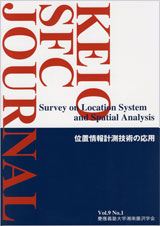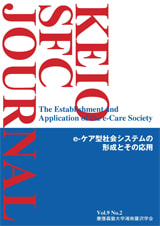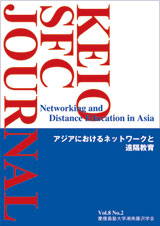- HOME
- KEIO SFC JOURNAL
- Vol.9 No.1

KEIO SFC JOURNAL Vol.9 No.1 Survey on Location System and Spatial Analysis
published on 2009.09
-
Geospatial Approaches towards Biodiversity Conservation - Case Study in Fuji-Tanzawa regions in Japan
Tomoko Doko Doctoral Program, Graduate School of Media and Governance, Keio University Research Fellow of the Japan Society for the Promotion of Science Hiromichi Fukui Professor, Faculty of Policy Management, Keio University In this paper, we introduce several geospatial approaches for biodiversity conservation, taking an example of our on-going project. Chapter 1 introduces the needs of ecological networks formation, and Fuji-Tanzawa regions as the study area. Chapter 2 presents the ecological modeling approach which can model species' geographic distribution and assess present needs for the ecological networks. Chapter 3 outlines fieldwork for Asiatic black bears' ecology, which focuses on the capture and collecting fieldsigns. Chapter 4 introduces few experimental results on an advanced satellite tracking system, namely GPS-AROGS, concerning animal movement. Chapter 5 presents a Web-based GIS development as a policy making support system for conserving biodiversity. Chapter 6 briefly described future works.
Download this article (PDF): SFCJ9-01.pdf -
Fundamental Study on GPS-based Behavior Research
Shuichi Matsumoto Senior Associate Professor, Advanced Research Center, Keio University In recent years GPS cellular phone is widely utilized on traffic behavior researches. By analyzing GPS positioning data on probe person surveys, this research examines degrees of accuracy of traffic modes, transfer pathways, and stop-off points of the carriers. For this research the author adopted pilgrims as experimental subjects and analyzed how they moved from one temple to another by examining their GPS log data. As a result, this research successfully estimated pilgrims' traffic modes and stop-off points with a high degree of accuracy.
Download this article (PDF): SFCJ9-02.pdf -
Landscape Evaluation Based on Measurements of Biological Signals
Shinichi Kikuchi Assistant Professor, Faculty of Environment and Information Studies, Keio University Ryoko Fukuda Assistant Professor, Faculty of Environment and Information Studies, Keio University Tomoyuki Furutani Associate Professor, Faculty of Environment and Information Studies, Keio University Shun Ishizaki Professor, Faculty of Environment and Information Studies, Keio University The maintenance of landscape has been traditionally based on the results of subjective assessments, focusing on the building height and its colors. Nowadays the landscape act promulgated, and we further need to confirm whether the evidences in terms of human science could be demonstrated as well. For that purpose, the brain activities and eye movements while seeing the landscape pictures on the display were measured with near-infrared spectroscopy (NIRS) and eye tracker, respectively. Indeed, the regional cerebral blood flow in spatial recognition regions significantly increases, and the eye movement pattern revealed that the layout and elements of landscapes were grasped. In the future, the sensing of biological signals would enhance the objectivity in landscape assessments.
-
Spatio-Temporal Data Mining of Tourist Behavior
Tomoyuki Furutani Associate Professor, Faculty of Environment and Information Studies, Keio University Japan Tourism Agency (JTA), established in October 2008, is expected to promote and manage both inbound and outbound tourism policy. One of the JTA's issues is to conduct tourism-related surveys such as tourist behavior, accommodation and tourism satellite account. This study aims to show several examples on tourist behavior survey conducted in Hakone area and to propose a data mining method that integrates a spatio-temporal clustering and a hybrid hierarchical clustering in order to produce clusters on tourists' individual attributes and their behavior dynamics obtained by GPS. First of all, tourists' behavior survey is conducted in Hakone area. Secondary, the proposed clustering method is applied. The number of clusters are detected automatically by maximizing averages of each cluster' s correlation of individual attributes and spatio-temporal kernel density. Then, 150 one-day trip tourists are clustered into 18 types and 239 two-days trip tourists are clustered into 24 types. It is also indicated that each cluster's features relates tourists' usage of tourism related media and travel information.
-
Profiling Taiwanese Leisure Travelers to Japan Using a Market Segmentation Approach
Isabell Handler Doctoral Program, Graduate School of Media and Governance, Keio University In 2003 a marketing campaign to increase the number of inbound tourists was launched by the Japanese government with the aim to reduce the deficit created by the large number of outbound tourists (16.22 Mio) and the relatively small number of inbound tourists (4.77 Mio). Since then Visit Japan Campaign (VJC) has been active for several years using a quite unusual approach compared to tourism literature such as Pearce [2005], Kotler et al. [2006], Swarbrooke et al. [2007] and Dickman [1999]: Instead of including demographic characteristics, geographic location or the motivation factors of tourists, of neither leisure tourists or business travelers, in the campaign, a mass marketing strategy has been designed for achieving the above stated target. As this might constitute a major weakness of the campaign, this paper tries to give a suggestion for a customized marketing campaign using the example of Taiwanese leisure tourists, which constitute one of the most important markets for Japan. The study used questionnaires distributed to tourists from Taiwan who visited Japan for a leisure vacation during August 2007 asking them about VJC and their motivation to travel to Japan. Applying quantitative methods on the database, market segments were created which can constitute an alternative to the existing course and invite further research on this topic in the future.
Download this article (PDF): SFCJ9-05.pdf -
The Treatment of Nouns that Adjoin to Clauses by Using Lexical Functional Grammar
Tomoko Ohkuma Doctoral Program, Graduate School of Media and Governance, Keio University Research and Technology Group, System Technology Laboratory, Fuji Xerox Co., Ltd. Some Japanese nouns make a subordinate clause by adjoining to the clause. The nouns have two syntactic roles there. One is an antecedent and the other is a kind of complimentizer (adverb builder). The distinct syntactic roles the noun has make a parser output redundant f-structures. The purpose of this paper is to distinguish the syntactic roles of such kind of nouns. We implemented rules for it that work on a parser based on Lexical Functional Grammar (LFG). The results of experiments by using newspaper corpus show our rules are enough accurate.
-
Unfinished Safety Ensuring - The decision-making process of self-defense forces dispatch to Mozambique
Takayuki Shoji Doctoral Program, Graduate School of Media and Governance, Keio University SDF dispatch to Mozambique became a new launch pad towards a dispatch to Africa. This article verifies domestic policymaking process in the Mozambique dispatch to focus on the safety ensuring. Japanese government considered safety based on five principles in the choice of the dispatch place. However, the issue of safety ensuring will lie low after the decision of the dispatch place. The request of the United Nations and the death of the civilian police in Cambodia were a momentum to confirm the tendency. As a result, though the Mozambique dispatch was prepared for in half normal periods, it brought delay and dependence to other countries for local activity and increased burdens of the dispatched personnel.
Download this article (PDF): SFCJ9-07.pdf -
The Comparison of the Diet in 2000-2007 and the Divided Diet in 2008
Junsuke Matsuura Doctoral Program, Graduate School of Media and Governance, Keio University The purpose of this study is to clarify the differences of the legislative process between the Diet in 2000-2007 and the divided Diet in 2008. It intends to measure the autonomy of the legislative management of the House of Councilors through the "Order" of the bill resolution in the plenary session of the House of Representatives and the House of Councilors. According to the analysis, it suggests that some remarkable changes have occurred not only in the outcome but also in the process of deliberation of bills in the Diet after the Upper House election in 2007.
Download this article (PDF): SFCJ9-08.pdf -
Politics over Values and Boundaries on "New Danes" - Cleavages and immigrant/refugee policy in Denmark
Tomoko Nakamura Public Management Division 1st grade, Graduate School of Public Policy, the University of Tokyo Today new value-based cleavages come to fore of the Danish social and political arena; on the contrary, the traditional cleavages which S. Rokkan argued are declined. New cleavages over "new politics" arise following the discursive immigrant/refugee policy. Among Danes, the biggest predictor of party affiliation may be education. Concerning "new Danes" who are objectives of the integration policy, a new cleavage is arisen in the political sphere that emerges between "new left" postmodern issues on the one hand, and "new right" issues on the other.
Download this article (PDF): SFCJ9-09.pdf
-
Prospect for a New Information Service Based on PoliNeCo (the Policy Facilitator on Internet)
Takashi Iwata Senior Visiting Researcher, Keio Research Institute at SFC Representative, HammerBird Corporation This memorandum prospects possibility of new service model which serve compiling information and make intelligence by facilitation for mass-media in existence (newspaper, TV, magazine). This memorandum based on the knowledge acquired by the Policy Facilitator on Internet named as "PoliNeCo (Political Needs Coordinator) ". PoliNeCo can check this URL: http://www.polineco.jp/

